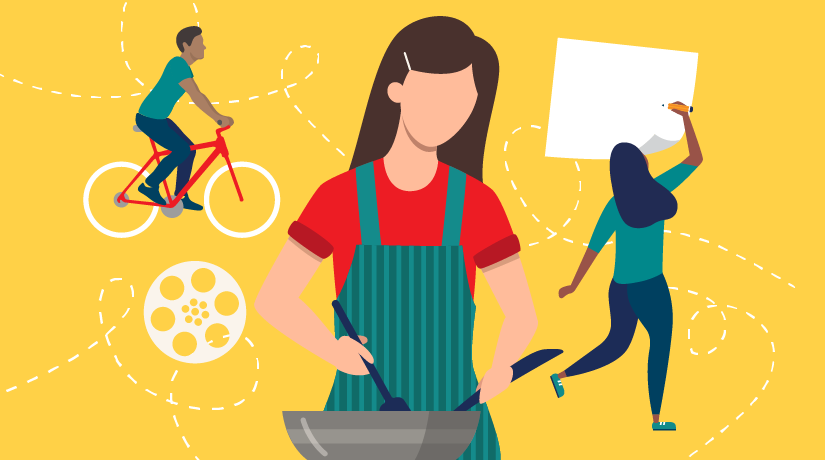As we wait for a possible and at least partial return to the office, there are things that we can all do to stave off the strains of homeworking.
For many of us it started as one of those changes to our lifestyle brought about by Coronavirus and lockdown, but now it’s clearly here to stay.
According to a survey of nearly a thousand company directors conducted in September and published by the Institute of Directors, nearly three quarters (74%) said they would be keeping increased homeworking after coronavirus.
While some of us have benefitted from a home office or pod, others have found ourselves doing Zoom calls on the kitchen table and trying to pacify children as we start on that monthly report. Giving up the commute might be nice but what about the absence of those chats with colleagues at the coffee machine or the impromptu meeting in the corridor that results in a great idea?
It seems that many of us are missing the office. A survey by the CIPD, a professional human resources organisation, revealed that around half of those of us working remotely are looking forward to returning to our offices. Around the same figure have found that social connections at work have worsened. This figure rises to exactly half of those who are not attending their normal workplace, compared with just 29% of those who are.
95 per cent would like to return to the office
Concerns about catching the virus are one of the mains reasons for a reluctance to return to the office. According to research published in Insight, a platform covering issues related to the workplace, a remarkable 95 per cent of those asked would like to get back to the office, following the development of a vaccine.
One of the reasons for this interest in returning to the workplace could be clashes with family and flatmates. A survey of home workers, part of a project Working@home and led by Professor Abigail Marks, a professor of work and employment in management, work and organisation at the University of Stirling, found that 37 per cent reported that home conflicts have increased. Nearly a quarter said that their general health was poor or very poor. Not surprisingly, the most frequent cause of arguments within the household was “interrupting or being noisy while you work”.
As we wait for a possible and at least partial return to the office, there are things that we can all do to stave off depression and irritation and improve the experience of working from home. Yanmengqian Zhou, graduate assistant in communication arts and sciences at Penn State College of the Liberal Arts and colleagues looked at coping strategies among American adults during the first few months of the pandemic. Their recommendations included keeping a consistent schedule and reminding yourself that this too will pass.
The power of distraction
Another suggestion was distraction – something that we’ve mentioned before here. Immersing yourself in a hobby or activity that is absorbing and engaging such as non-work-related reading, watching films, cooking, doing sports or getting involved in the arts can all help to raise your spirits and prevent unhelpful rumination.
It’s not about running away from a problem – it’s about taking a break from it so that you can come back to it refreshed. The key is to focus on one of these activities completely, lose yourself in the moment and try to avoid returning to the stresses of lockdown or any other problem.
Another form of distraction that psychologists are increasingly interested in is walking – but not just any old stroll. Psychologists call it “awe” walking. If you’ve ever looked up at the stars and well, just wondered about the universe, you’ll know how a sense of awe, that you’re part of something vast, can be transcendent and uplifting. You might find yourself less focussed on yourself and your own immediate concerns. You can recreate this feeling during a walk.
In a recent study conducted by Dr Virginia Sturm, associate professor of neurology and psychiatry and behavioural sciences at the University of California at San Francisco, 60 older people took a 15-minute walk every week for eight weeks. Half of them were assigned to a simple walk group, while the other half became part of an awe walk group. Here the researchers explored the concept of awe and suggested that the walkers try to experience this feeling. Not only did this group experience that sense of awe and wonder, according to questionnaires that they completed, but they also reported significant boosts of positive prosocial emotions such as compassion and gratitude.
Walking with awe
The other group was more focussed on immediate concerns and particular worries. When the groups were each asked to take selfies, another interesting distinction emerged. Those in the awe group made themselves smaller and less prominent, than did walkers in the control group. They included more of their surroundings and their smiles became measurably more intense, as they took more interest in those surroundings.
“One of the key features of awe is that it promotes what we call ‘small self,’ a healthy sense of proportion between your own self and the bigger picture of the world around you,” says Dr Sturm in an interview in Psychology Today.
Whether we’re working at home or in the office, the healthy distraction of a hobby or an awe walk is an enjoyable, easy and inexpensive way to manage our moods and keep our spirits up.



